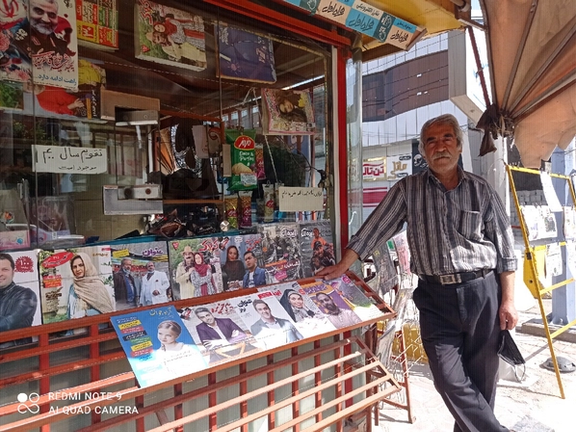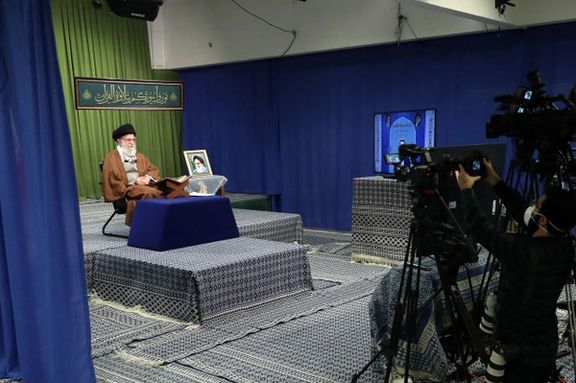Iran Restructures Media Landscape To Tighten Central Grip

Iran's Culture Minister has confirmed that a restructuring of state media landscape is underway as a response to priorities put forward by the Supreme Leader.

Iran's Culture Minister has confirmed that a restructuring of state media landscape is underway as a response to priorities put forward by the Supreme Leader.
The change in the Iranian media scene started with the appointment of Payman Jebelli as the head of the country's state television as the most significant media outlet directly under the supervision of Khamenei and his office. A long-time manager at state television, he has close links with Khamenei’s office and key hardliners.
Minister of Culture Mohammad Mehdi Esmaili made the remark while introducing Farshad Mehdipour, another hardline journalist and a relative of Supreme Leader Ali Khamenei's wife as his deputy minister for the press. Mehdipour was previously the editor of conservative e Sobh-e No newspaper that was Majles Speaker Mohammad Bagher Ghalibaf's mouthpiece when he was the mayor of Tehran. Esmaili introduced Mehdipour as a “theoretician” in news dissemination.
No one knows how much the government spends on state media, but in mid-2010s before the effective devaluation of Iran currency, the state television budget alone was close to one billion dollars, with more than 40,000 employees in 2020 compared with CNN’s 4,000. Thousands of people also work for hundreds of state newspapers and websites.

Another step in the restructuring of the media landscape is the belated appointment of the managing director and members of the high council of the official news agency IRNA, which stands for the Islamic Republic News Agency.
Esmaili appointed Ali Naderi, an ultraconservative journalist and the former editor of hardline Raja News, a pro-Ahmadinejad and pro-Paydari Party news outlet as the new managing director of IRNA. Naderi has said that IRNA is going to be "the news agency of the government and the political system [Nezam]”, which is also a nickname for Khamenei used by his devotees when they wish to distance him from his style of micromanagement.
IRNA has traditionally been under the control of presidential administrations, usually echoing the ideas and highlighting 'accomplishments' of the country's presidents. Its political slant changed with every presidential election. It was a proreform news outlet under President Mohammad Khatami, a hardline agency under Ahmadinejad and a moderate conservative news organization under President Hassan Rouhani.
With the appointment of the members of the High Council of Policymaking of IRNA, it appears that Tehran is serious about tightening its grip on the media, news dissemination and all sorts of cultural activities. The new council members are hardliners mainly supporting the ultraconservative Paydari Party, although Mehdipour is better characterized as a member of Qalibaf's self-proclaimed neo-con group.
Esmaili appointed another Paydari Party affiliate Mohammad Khazaei as deputy culture minister for cinema.
Meanwhile, the new deputy for cultural affairs who oversees books and other publications, Yasser Ahmadvand, and the acting deputy minister for artistic affairs Mahmoud Shaloui whose mandate is to make sure that musical and theatrical activities, as well as paintings and sculptures strictly comply with Shiite standards, are also well-known hardliner figures.
Even before introducing the new changes, dozens of news outlets in Iran belonged to either Khamenei's office (Kayhan, Khorasan and a fleet of social media platforms, etc.) or the revolutionary guards IRGC (Tasnim, Fars, Sepah News, Basij News, Basirat, Javan, Sobh-e Sadeq, etc). Others such as Mehr (Islamic Propagation Organization), Hemayat, Mizan News (the Judiciary) and scores of others were funded by various government offices.
The question now is that if the entire system is becoming part and parcel of the “regime”, or Khamenei’s office, and there is no room for factional politics, why the government needs over 50 TV channels and tens of news agencies, newspapers and news websites. Their only purpose appears to be for insider groups to receive hundreds of millions of dollars in funding from state coffers.